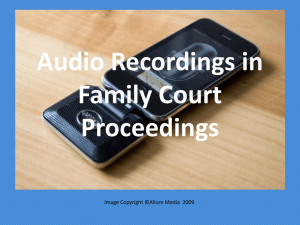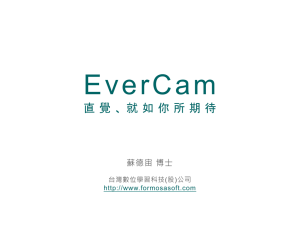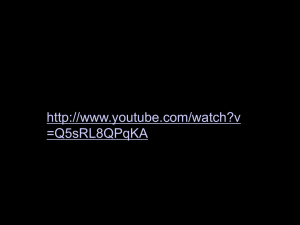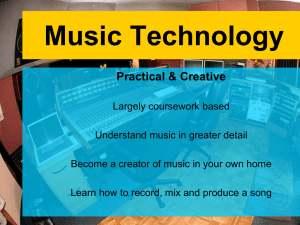Policy on the Recording of Lectures and Other
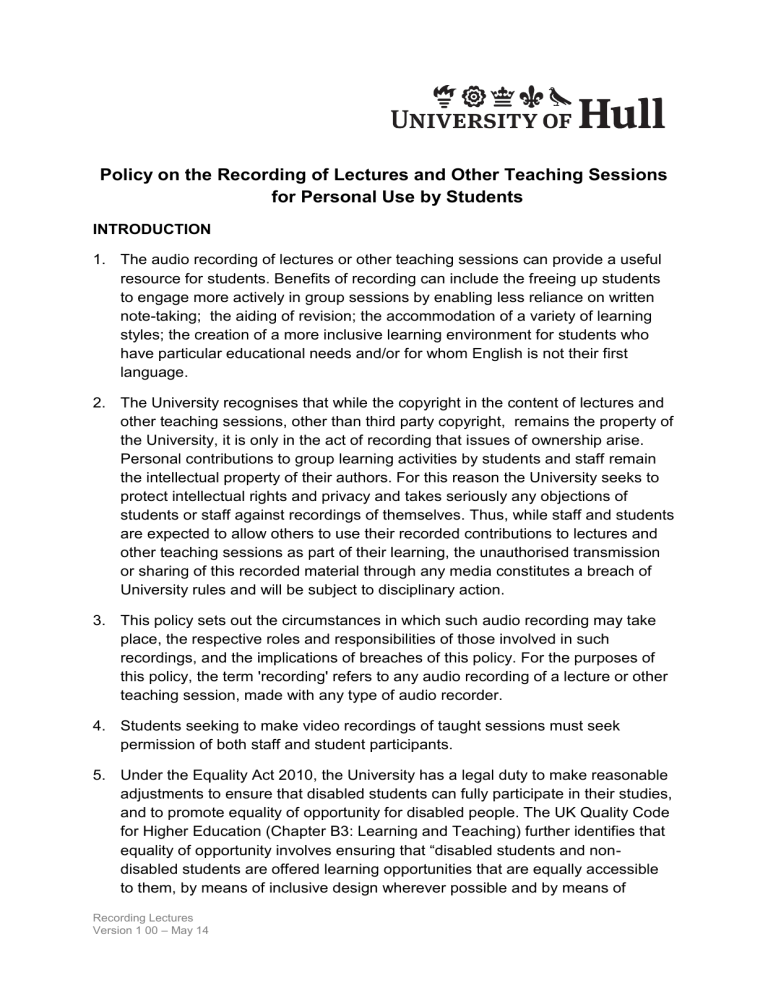
Policy on the Recording of Lectures and Other Teaching Sessions for Personal Use by Students
INTRODUCTION
1. The audio recording of lectures or other teaching sessions can provide a useful resource for students. Benefits of recording can include the freeing up students to engage more actively in group sessions by enabling less reliance on written note-taking; the aiding of revision; the accommodation of a variety of learning styles; the creation of a more inclusive learning environment for students who have particular educational needs and/or for whom English is not their first language.
2. The University recognises that while the copyright in the content of lectures and other teaching sessions, other than third party copyright, remains the property of the University, it is only in the act of recording that issues of ownership arise.
Personal contributions to group learning activities by students and staff remain the intellectual property of their authors. For this reason the University seeks to protect intellectual rights and privacy and takes seriously any objections of students or staff against recordings of themselves. Thus, while staff and students are expected to allow others to use their recorded contributions to lectures and other teaching sessions as part of their learning, the unauthorised transmission or sharing of this recorded material through any media constitutes a breach of
University rules and will be subject to disciplinary action.
3. This policy sets out the circumstances in which such audio recording may take place, the respective roles and responsibilities of those involved in such recordings, and the implications of breaches of this policy. For the purposes of this policy, the term 'recording' refers to any audio recording of a lecture or other teaching session, made with any type of audio recorder.
4. Students seeking to make video recordings of taught sessions must seek permission of both staff and student participants.
5. Under the Equality Act 2010, the University has a legal duty to make reasonable adjustments to ensure that disabled students can fully participate in their studies, and to promote equality of opportunity for disabled people. The UK Quality Code for Higher Education (Chapter B3: Learning and Teaching) further identifies that equality of opportunity involves ensuring that “disabled students and nondisabled students are offered learning opportunities that are equally accessible to them, by means of inclusive design wherever possible and by means of
Recording Lectures
Version 1 00 – May 14
reasonable individual adjustments wherever necessary”. As such, the University also normally permits the audio recording of lectures and other teaching sessions for personal use by all students, as part of its commitment to the creation of an overarching inclusive learning environment.
PRINCIPLES AND PRACTICE
6. The University regards staff recording their own lectures and other teaching sessions to make available online as good practice, noting that due process must be followed where recordings include the intellectual property of others.
7. Where lectures and other teaching sessions are not recorded by the lecturer, the
University normally permits their recording for personal use by students, as part of its commitment to creating an inclusive learning environment. Instances where recordings are not permitted are deemed as exceptional.
8. Students are not normally required to ask permission to record lectures or other teaching sessions for personal use. The University does not deem it appropriate to place the onus on students actively to ask for permission as doing so conflicts with the spirit of inclusive practice that is fostered at the University of Hull.
9. Recordings made by students should be as overt as possible (i.e. on equipment that is visible) in order that the lecturer and other students are aware that they are being recorded. It is accepted, however, that in large group sessions (i.e. lectures) not all students and staff are likely to be able to see the recording equipment or know that recording is taking place.
10. The University recognises that while the copyright in the content of lectures and other teaching sessions remains the property of the University, it is only in the act of recording that issues of ownership arise. Verbal and/or physical contributions to group learning activities by students and staff, for example, remain the intellectual property of their authors. As such, it is important to distinguish between two key different types of teaching session where recording may take place: a. Large group sessions (e.g. lectures) where recordings are primarily of academic staff, of reported-back responses from group activities or of answers to specifically posed-questions. These sessions will normally contain no or limited personal, sensitive and/or confidential contributions from staff or individual students. Such sessions will normally always be open to recording by students. b. Small group interactive sessions (e.g. seminars, tutorials or break-out activities within larger groups) where staff and students are active in generating content and outputs through discussions and group activities
Recording Lectures
Version 1 00 – May 14
and where some of the discussion or content may be personal, sensitive and/or confidential. In such sessions permission to record the teaching session may be withheld by staff or participating students where they have a clear and justifiable cause to believe that the recording will breach privacy and/or impede the learning of those taking part.
11. At all times in a lecture or teaching session that is being recorded by staff or by other students, all parties have the right to request that the recording is stopped for a particular discussion or section of the session if they are uncomfortable with the recording continuing.
12. The University acknowledges that there are occasional circumstances where the recording of a lecture or other teaching session may not be appropriate. If the nature of the subject covered in a session is deemed in advance to be too sensitive or controversial for recording, staff should announce to participating students that recording will not be permitted. Where a staff member takes a decision to withhold consent for the recording of a whole lecture or other teaching session, the reasons for this should be noted and reported to their
Head of Department. In addition, if consent is withheld, in line with the requirements of the Equality Act 2010, staff should provide alternative ways of accommodating the needs of those for whom recording is a reasonable adjustment (see paragraphs 15-16).
13. Student-made recordings of lectures and other teaching sessions are for the sole use of the individual concerned, cannot be made on behalf of other students and are not for wider public consumption by any means, including by virtue of external dissemination electronically or otherwise. The recording must not be left open to external scrutiny, be reproduced or passed on to anyone else, other than for transcription purposes. Once the recording has served its purpose, it should be erased. This will normally be after the final degree result has been achieved and confirmation that future learning from the recording will not be necessary.
While staff and students are expected to allow others to use their contributions to lectures and other teaching sessions as part of their learning, the unauthorised transmission or sharing of this recorded material through any media constitutes a breach of University rules and will be subject to disciplinary action.
14. At the beginning of a module, and in relevant module documentation, students should be informed that in line with this Policy, lectures and other teaching sessions may be recorded by the lecturer to be made available online or by other students for personal use. Students who intend to record teaching sessions for personal use should also be reminded of the consequences of breaching the rules set out in this Policy.
Recording Lectures
Version 1 00 – May 14
15. If a third-party is contracted to undertake lectures or other learning sessions on behalf of a Module Leader, it is the responsibility of the Module Leader to ensure that the third-party understands and agrees to the details of this policy before teaching begins.
RECORDINGS MADE BY DISABLED STUDENTS
16. The Assessment of Needs report for many disabled students registered with
Disability Services includes the recommendation that an audio-recording device may be used in lectures, seminars or other teaching events. This is because some disabled students will encounter difficulties in listening or observing a lecture and taking notes at the same time, for reasons related to their disability.
Allowing students to use an audio-recording device in these circumstances will normally be a reasonable adjustment which the University and its staff are required to make under the Equality Act 2010. Not all disabled students will have access to an Assessment of Needs, as this is an externally undertaken assessment that applies only to students eligible for the Disabled Students
Allowance (DSA). As such, specific recommendations made by Disability
Services are deemed to carry equal weight to those made in an Assessment of
Needs report.
17. Where it is not appropriate to permit the recording of a whole lecture or teaching session the responsible member of staff must ensure that an alternative reasonable adjustment is made (for example, providing a set of written or audio notes to augment the information provided in the lecture or other teaching session or a one-to-one tutorial where students are able to record the discussion that they have with the lecturer). Disability Services are able to offer advice and guidance around alternative reasonable adjustments where it is not appropriate to permit recording.
Approved by: Senate, June 2014
Review date:
Contact:
May 2017
LEAP
Recording Lectures
Version 1 00 – May 14

